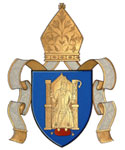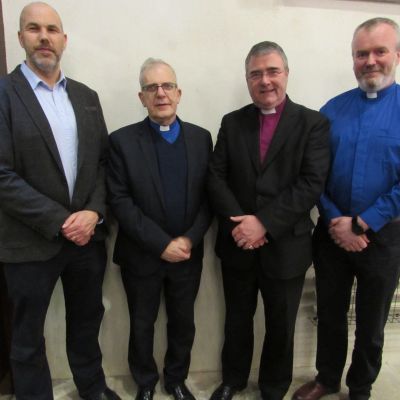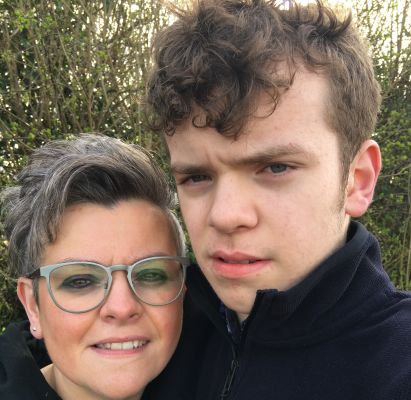 |
 |
News
Church shines a light on autism with information meeting
A group within the Church of Ireland Clogher Diocese has been discussing how the church can respond to the needs of those families affected by autism.
The Diocesan Board of Social Theology in Action held an information evening on autism 'Dealing with Difference' in Clabby Parish Church.
This month, April, is Autism Awareness Month when the development disorder is highlighted to the public.

The Bishop of Clogher the Right Revd John McDowell(second right) with speakers at the meeting
Those attending the event in Clabby Parish Church, including clergy, people working with autistic children and young adults and carers, heard from Ethel Johnston, a mother of an autistic 16-year-old boy on how his condition affects her family, how they cope and how faith has played a major part in them accepting he is different.
The meeting also heard from Mark Sproule, who organises courses on autism for parents, teachers and carers of autistic sufferers across the British Isles and how his own sons have coped with the disorder.

Ethel Johnston one of the speakers with her son Isaac.
Ethel Johnston, speaking at the meeting, gave her personal experiences of living with autism within the family and home setting. Her eldest son, Isaac, was diagnosed with autism at the age of two after Ethel and her husband Sam had become concerned about him when he was one and a half years old, as he appeared distant and did not have appropriate speech for that stage.
So what is it like to be living with autism?
'Unfortunately there is an ignorance and lack of understanding. Autism is a lifelong development disorder which affects the person's communication skills and how they relate to the world around them,' she explained.
'Autistic children have difficulty with communication, social interaction and imagination.
'When Isaac was diagnosed at the age of two, the bottom fell out of our world. We mourned the child we had planned for but we accepted the gift of Isaac which God gave us,' she told the meeting.
'We had to accept how God had created him.'
Ethel went on to explain how they as a family cope with Isaac's disorder.
'Our home life is very busy. We live with autism 24/7. Isaac loves outdoor activities, playing on the trampoline outside, playing football with his brothers, Ski Mobility at Craigavon ski slope and keeping fit but he can be aggressive and forceful.
'Respite is important, not only for Isaac but also for the whole family,' Ethel said.
Faith plays a huge part in the lives of the Johnston family, Ethel explained: 'Our church and our faith keep us going.'
Isaac was presented for confirmation and he attends church as often as possible with members of the family. Going to church as a family is one of Ethel's favourite moments.
There are difficult times but Ethel explains how she and her family know they are getting God's support.
'Autism has a ripple effect on siblings and family members. At times I have been heartbroken but we give thanks daily for Isaac. There are dark days but with God's help we will carry on. Isaac has taught us so much and his brothers' lives are enriched as well.'
Also speaking at the meeting was Mark Sproule, a tutor who runs courses on autism across the British Isles for people working and living with autistic children. He spoke on Positive Behavioural Support.
'There is a lot of ignorance of autism in Northern Ireland,' he said at the outset.
As Mark and his wife, Arlene have two grown up sons with autism, they established a martial arts club in Newtownstewart for children with autism and family members of autistic children. The idea of the club is to give autistic children renewed confidence and improved social skills.
He explained the various degrees of autism. One of the problems is that autistic children and adults do not pick up on body language and tone of voice, for example.
Children with autism will also challenge parents. He gave some helpful hints to those engaging with autistic children and young adults such as speaking in a calm but persistent voice, having a firm manner, being positive but non-threatening and using as few words as possible.
Autistic sufferers are often sensitive to lights.
During a discussion following the presentations, the thoughts of those present turned to adapting church services to make them more meaningful to autistic children and adults.